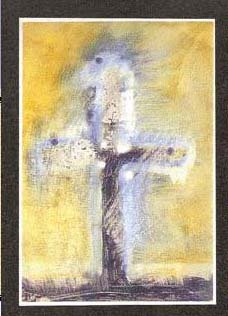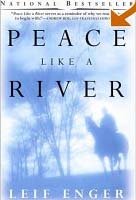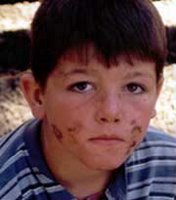Good versus evil?

Painting of cross is by Wes Hurd who is a featured speaker/teacher at the upcoming Art Conference at Box R Ranch in Southern Oregon on May 10-13.
It’s Easter—Resurrection Day!
I lie here on my couch with a blown out knee, reading a contemporary novel by a fine Christian artist. I had to put the book down because the author just killed off one of the main characters. I’m disheartened. I wanted the good guy to win and for all the pain and suffering to have a good purpose.
Somehow the storyline got all wrapped up with my life and I’m hoping there will be a good purpose in my bummed leg, but the author has planted a seed of doubt and lack of hope.
Was that the author’s intention?
I think not. I think the author was caught up in today’s trend of being on the cutting edge and portraying evil at its vilest. I understand the reasoning behind this trend. Some of my favorite writers are on the forefront.
I won’t dispute their call to do so, but I think we as Christian writers may be making a mistake in thinking we must focus on portraying evil in all its raw wickedness in order to reveal the power of God’s light. I’ve put a lot of thought into this and I have several reasons for coming to this conclusion, all of which come from the Grand Story.
1. The ultimate battle is NOT between good and evil.
The goodness of God has been and always will be greater than any evil. Combining every wicked deed from the holocaust to the atom bomb with the evil of human hearts from the beginning of creation would still not deplete one iota of the goodness of God.
The cross is a perfect example of all evil coming together in one place, yet it did not crush God’s goodness. God’s goodness overcame the last enemy—death—through the power of the resurrection.
2. The true battle is between God’s perfect love and God’s perfect justice.
The antagonist and hero are one in the same. It is the ultimate conflict. The cross is an astounding resolution. God took the penalty for us in answer to His perfect justice, and in doing so He restored the way of perfect love.
3. To think we have discovered something completely new in retelling the Gospel is to throw out the classics that have proven immensely successful.
Frodo’s real battle was with the evil in his own heart. He needed a Savior, as do all of us. Could it be that spiritual battle is more about standing firm than advancing?
4. Focusing on evil glorifies the darkness more than the light.
We all understand evil. We don’t really need a whole lot of description. We were born into it. We live with it every day. But what do we know of light? What can we portray to our readers of a changed life? How does that happen in the real world?
I think we will render our greatest works when we lay down our pride and reveal the true battle of good and evil in our own hearts—the ability to choose. Will that choice lead us to God’s perfect love? Or to His perfect justice?
All road lead to the cross—that place of death. Will we lay down our own lives? Or will we pick up hammer and nail? This is the true climax of any good story. Only one road leads to resurrection—the satisfying end that gives life and hope to the reader.
This is the story I yearn for—one that sings with my soul. Peace Like a River, by Leif Enger is an awesome contemporary example of this kind of satisfying story. He left the tired clichés behind and painted the power of a changed life. (Read about Leif here.)
Peace Like a River, by Leif Enger is an awesome contemporary example of this kind of satisfying story. He left the tired clichés behind and painted the power of a changed life. (Read about Leif here.)
If we as Christians choose to write about evil, let’s make sure it’s not because we don’t want to take the time or energy to portray true light. To do that means we must be living in the power of the cross and resurrection on a daily basis. Death and Life. A constant laying down of everything that hinders, not walking in perfection, but standing firm and reaching forward in hope.
If that sounds too sweet or saccharine, perhaps it’s because we’ve opted for less and haven’t yet tasted of true resurrection power. Wouldn’t it be great if this Easter we begin to drink from the Living Water and have it overflow into every word we write and every painting we create?
Enjoy the Son!







0 Comments:
Post a Comment
<< Home